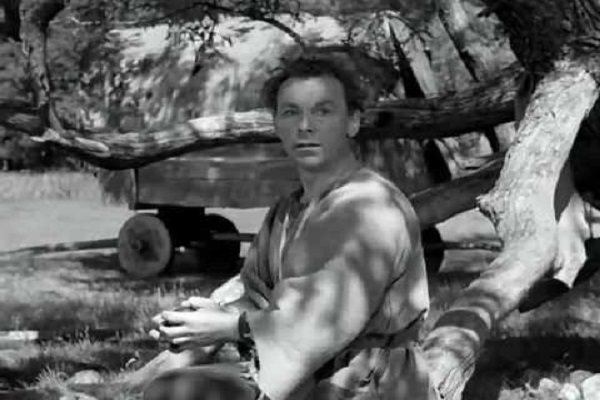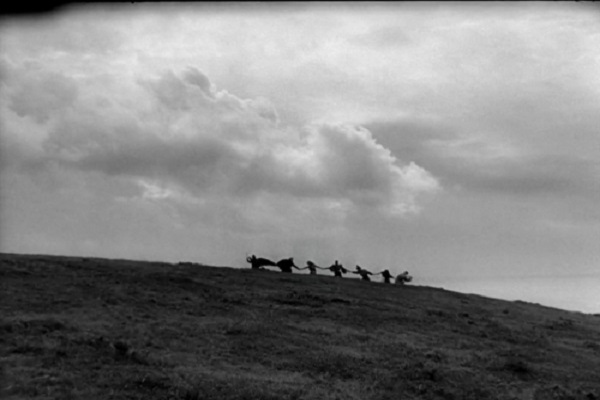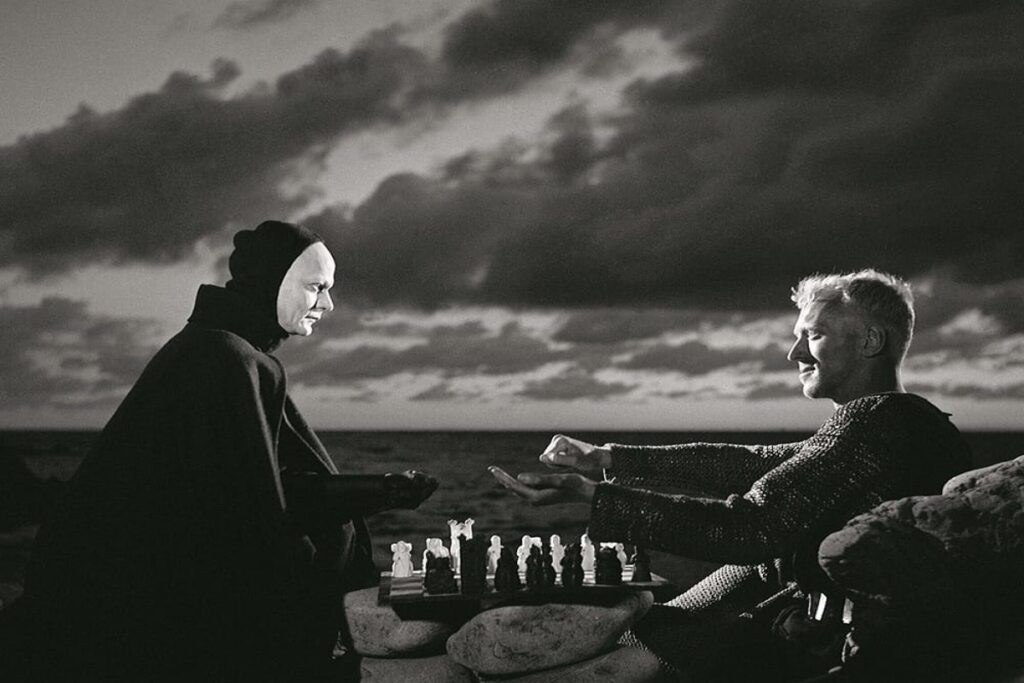Ingmar Bergman is considered one of the most influential filmmakers of all time across the world. He redefined cinema in the 1950s. The world recognized him for the first time through his famous theme “The Silence of God”. His incredibly spiritual and religious film The Seventh Seal reflects the same contemplation. A knight named Antonius Block (Max Von Sydow) returns to plague-ravaged Sweden after fighting in the Crusades and plays chess with Death (Bengt Ekerot). His existence in this world will last as long as the game continues. He will be spared only if he wins the game. However, he must leave this world if he loses the game. The decade-long fight in the name of religion has disillusioned him. He struggles to find the same faith in God that he possessed earlier. Becoming utterly pessimistic, he experiences only the gloomy atmosphere surrounding him and dares to question “The Silence of God”. His squire Jons (Gunnar Bjornstrand) also mocks the painful and deadly religious fight in the name of God. Both the knight and his squire are deeply tormented by the burning of an innocent woman after the Church and the soldiers slander her as a witch. Even though Bergman intensely questions the existence of God through this film, he also shows his faith in the existence of God when the actor Jof sees the Virgin Mary and little Jesus in his imaginary vision. Irrespective of Bergman’s questions regarding God’s existence, The Seventh Seal is undoubtedly one of the most spiritual and religious films ever.
One of the important aspects of the film is the atmosphere portrayed in The Seventh Seal. It is cloudy, dark, and gloomy throughout the film. Viewers can get a sense of the theme of the film from the very first shot when an ominous eagle is seen flying over the plague-ravaged Sweden. The pessimistic and painful life of the 14th century is portrayed throughout the film.

Bergman’s childhood was spent under the strict supervision of his father who, initially, was a Lutheran minister and became a chaplain later. So, his childhood was intensely influenced and impacted by Christianity and spirituality. So, quite naturally, his works were also deeply inspired by Christianity and spirituality. He was afraid of death during his youth. So, when he saw a medieval painting of Death playing chess painted by famous painter Albertus Pictor on a church wall in Taby, he was intensely impacted by it and wrote his play “Wood Painting”. He adapted it into his feature film The Seventh Seal. It was quite surprising that he could get rid of his fear of death after making this film.
Critics often cite historical inaccuracies in The Seventh Seal. The Crusades were fought before the 14th century. The witch burning and flagellant movement came to Sweden after the 14th century. However, Bergman did not intend to make it a historically accurate film. He wanted to portray the miseries of the Mediaeval period in which a man could play the chess game with none other than Death himself. There is no denying the fact that the plague-ravaged 14th century was filled with immense pessimism. The family lives were completely tormented by famine, deathly diseases, superstitions, utmost control by the state and the church, and punishing poverty. Bergman incredibly depicted the pessimistic atmosphere of the 14th century in The Seventh Seal.
Bergman was born and brought up in a strict Christian family. His father was a Lutheran minister initially and then became a chaplain. So, his childhood and boyhood days were filled with Christianity and spirituality. Even though he was intensely influenced and impacted by religious sentiments, he has never been a submissive follower. He always asked for the reasons and formed his ideology since childhood. Because of his pragmatism, he lost faith at age eight and kept searching for God’s existence in his soul and the world. His soul searching for God’s existence is an important recurring theme of his films. He always questioned the silence of God. In The Seventh Seal, a disillusioned Knight returns from the Crusades and questions “The Silence of God”. He struggles to restore his faith in God and earnestly prays for God to appear before him. He questions God’s existence in the most difficult and pessimistic time of the 14th century. Under utter helplessness, he wants to kill God in him. In The Seventh Seal, Bergman vividly shows the sheer helplessness of a person when he loses faith in God. His life becomes futile, restless, and terrible.
Even though Bergman intensely questioned “The Silence of God”, he never denied God’s existence. He restored his faith later. In the film, Jof sees the Virgin Mary walking little Jesus in his imaginary vision, and his soul is filled with divine happiness. In an utterly controlled and pessimistic world, a person may lose faith. However, the essence of divine intervention may not leave him when he keeps searching for the divine spark in his soul. Ingmar Bergman is one such example.
Bergman lost faith in God at an early age and questioned God’s existence multiple times through his works. However, he was never against Christianity. His protest was against the control of the church and the state of common citizens. He intensely condemned the interference of the state and church in the daily lives of common people. Multiple times, they crossed all the limits and created social terror. The witch burning in the film is a vivid example of such instances. An innocent woman is accused of being responsible for causing and spreading the plague. She is held accountable and burnt in full public view. Nothing can be more shameful and disgusting than this. Bergman meticulously portrays this pathetic and unfortunate incident in The Seventh Seal.

One of the most important characters in the film is the Squire. Bergman portrays this character in the film as a representative of the common people who are not ignorant and ask genuine questions out of their senses. He is not ready to accept anything unreasonable in the name of religion. When the flagellants pass by, he mocks why they whip themselves. When the soldiers tell him that the witch can’t tolerate the stinking smell, he mocks at them that he also can’t tolerate it. He cannot accept fighting throughout a decade in the name of religion. He sarcastically says, “My master and I have been abroad for fighting in the crusade. For 10 years, we let snakes bite us, insects sting us, animals maul us, heathens slaughter us, the wine poison us, women infect us, lice eat us, and fever rot us – everything in the name of God. Our Crusade was so stupid only an idealist could have invented it. It’s worse than the plague.” However, he is an incredibly kind person. When he sees the half-dead witch, he immediately intends to rescue her killing the guards when the knight stops her as it is pointless now. He pours water into the witch’s mouth and asks the Knight, “Who will save her? Is it the angels or God or Satan or just emptiness? Our fears and hers are the same.” He reflects both her and their helplessness.
Through The Seventh Seal, Max Von Sydow became known internationally. His portrayal of the disillusioned Knight questioning God’s silence in plague-ravaged Sweden is outstanding. Bibi Anderson as the actress Mia appears in the film as pure as the Virgin Mary herself. Gunnar Bjornstrand plays the character of the Squire straight forward. Bergman depicts his character as a representative of the common people. He saves a girl from being raped and desperately tries to save the witch from getting burnt. However, when required, he punishes the culprit named Raval as well.
One of the most important aspects of The Seventh Seal is Gunnar Fischer’s incredibly dynamic black-and-white cinematography. Each shot of the scene, when the Knight plays chess with Death, looks like a black-and-white portrait. He illuminated Death’s face so magnificently that its black-covered avatar became incredibly sharp, lively, and a topic for discussions and parodies for decades. Multiple close-up shots make the characters look real and capture their crude emotions. When the witch is about to be burnt and the knight asks her if she has seen the devil, her response is captured in a low camera angle making her character appear immensely strong but sarcastic to the state and the church. However, the Knight appears shaken at the high camera angle. Fischer’s inquisitive camera is slow-paced and observant of the plague-ravaged Denmark. Erik Nordgren’s music, on the one hand, complements the religious and spiritual theme of the film and, on the other hand, resonates with the enormous human suffering portrayed in the film.
